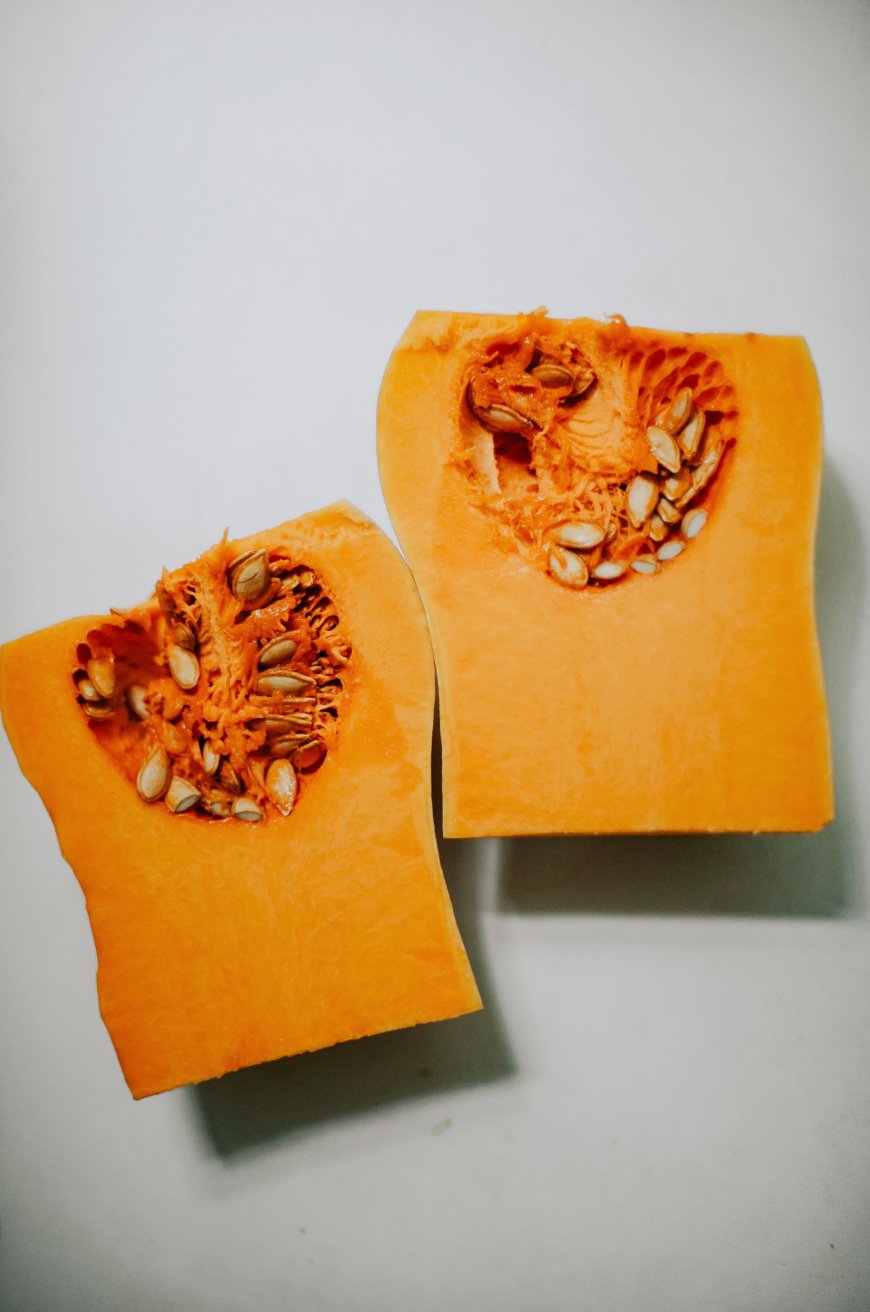Are Pumpkin Seeds Keto-Friendly? Unveiling the Nutritional Benefits and Health Implications
Discover the keto-friendly benefits of pumpkin seeds in our latest blog! Explore the nutritional profile of pumpkin seeds and learn why they make a perfect snack for a low-carb lifestyle. Uncover tasty recipes and essential insights on incorporating these nutrient-packed seeds into your ketogenic diet. Elevate your keto journey with the power of pumpkin seeds!

Introduction:
Pumpkins are not just seasonal decorations or ingredients for pumpkin spice lattes. They offer a wealth of nutritional benefits, particularly in the form of pumpkin seeds. In this comprehensive blog article, we will delve into the world of pumpkin seeds and explore whether they align with the principles of a ketogenic diet. Additionally, we will discuss various commonly asked questions about pumpkins, shedding light on their nutritional benefits and potential health implications. So, let's embark on this journey of discovering the keto-friendliness of pumpkin seeds and unlocking the secrets of this beloved autumnal ingredient.
|
Table of Contents: What is a Ketogenic Diet? Understanding Pumpkin Seeds: A Brief Overview Macronutrient Composition of Pumpkin Seeds Net Carbs in Pumpkin Seeds: Are They Keto-Friendly? Fiber Content and Its Impact on Ketosis Protein Powerhouse: Aiding Ketogenic Diets Micronutrients in Pumpkin Seeds Health Benefits of Pumpkin Seeds a. Heart Health and Cholesterol Management b. Antioxidant Properties and Immune Support c. Potential Anti-Inflammatory Effects d. Promoting Healthy Digestion e. Enhancing Sleep Quality Incorporating Pumpkin Seeds into a Ketogenic Diet a. Roasted Pumpkin Seed Snacks b. Adding Pumpkin Seeds to Salads and Roasted Vegetables c. Using Pumpkin Seed Flour in Baking Recipes d. Blending Pumpkin Seeds into Smoothies and Soups Other Frequently Asked Questions About Pumpkins a. Are Pumpkins Low in Carbohydrates? b. Can You Eat Pumpkin on a Keto Diet? c. How to Roast Pumpkin Seeds for Optimal Flavor? d. What Are the Different Varieties of Pumpkin? e. Are There Any Potential Allergies or Side Effects? Conclusion: Embracing Pumpkin Seeds in Your Keto Journey |
What is a Ketogenic Diet?
To understand the keto-friendliness of pumpkin seeds, it is important to first understand the concept of a ketogenic diet. A ketogenic diet is a low-carbohydrate, high-fat diet that aims to transition the body into a state of ketosis, where it primarily burns fat for energy instead of carbohydrates. This metabolic state offers numerous potential benefits, including weight loss, improved cognitive function, and increased energy levels.
Understanding Pumpkin Seeds: A Brief Overview
Pumpkin seeds, also known as pepitas, are the edible seeds found within pumpkins. They have a flat, oval shape and a white outer shell. These seeds possess a subtly sweet and nutty flavor, making them a popular ingredient in various culinary preparations around the world. Pumpkin seeds are often consumed roasted, but they can also be eaten raw or incorporated into recipes like salads, granola, and baked goods.
Macronutrient Composition of Pumpkin Seeds
To evaluate the keto-friendliness of pumpkin seeds, it is crucial to examine their macronutrient composition. A 100-gram serving of pumpkin seeds contains approximately 574 calories, distributed as follows:
Total Fat: 49 grams
Protein: 30 grams
Carbohydrates: 10 grams
Fiber: 6.6 grams
Net Carbs in Pumpkin Seeds: Are They Keto-Friendly?
When following a ketogenic diet, the focus is primarily on net carbs, which are calculated by subtracting the fiber content from the total carbohydrates. In the case of pumpkin seeds, the net carb count is relatively low, with only 4 grams of net carbs per 100 grams. This makes them a viable option for individuals adhering to a keto lifestyle.
Fiber Content and Its Impact on Ketosis
One important factor when evaluating the keto-friendliness of pumpkin seeds is their high fiber content. Fiber is indigestible and does not significantly impact blood sugar levels, making it a valuable asset for those on a ketogenic diet. The fiber content in pumpkin seeds aids in promoting feelings of fullness, regulating bowel movements, and supporting overall gut health.
Protein Powerhouse: Aiding Ketogenic Diets
Pumpkin seeds are a noteworthy source of plant-based protein. With 30 grams of protein per 100 grams, they offer a substantial boost to meet daily protein requirements. Protein is important for various bodily functions, including muscle repair and growth. Incorporating pumpkin seeds into a ketogenic diet can help individuals maintain adequate protein intake while keeping their carbohydrate levels in check.
Micronutrients in Pumpkin Seeds
In addition to their macronutrient profile, pumpkin seeds are rich in essential micronutrients. They are particularly abundant in magnesium, zinc, iron, and vitamin E. These nutrients play vital roles in supporting immune function, promoting healthy skin, aiding in energy production, and maintaining proper heart health. Including pumpkin seeds in your diet can be a reliable way to enhance your intake of these valuable micronutrients.
Health Benefits of Pumpkin Seeds
Pumpkin seeds offer a wide array of potential health benefits, which extend beyond their compatibility with a ketogenic diet. Let's explore some of these benefits in detail:
a. Heart Health and Cholesterol Management:
Pumpkin seeds contain phytosterols, compounds that may help lower LDL (bad) cholesterol levels, and reduce the risk of cardiovascular diseases. These seeds also contain magnesium, which plays a role in maintaining normal blood pressure levels and supporting overall heart health.
b. Antioxidant Properties and Immune Support:
The antioxidants found in pumpkin seeds, such as vitamin E and carotenoids, help protect cells from oxidative damage caused by free radicals. This antioxidant activity supports a healthy immune system, reducing the risk of chronic diseases and supporting overall well-being.
c. Potential Anti-Inflammatory Effects:
Certain components in pumpkin seeds, including omega-3 fatty acids and antioxidants, exhibit anti-inflammatory properties. This may help alleviate symptoms of inflammation in the body and reduce the risk of chronic diseases associated with inflammation.
d. Promoting Healthy Digestion:
The high fiber content in pumpkin seeds aids in promoting regular bowel movements, preventing constipation, and supporting a healthy digestive system. Additionally, the fiber in pumpkin seeds acts as a prebiotic, promoting the growth of beneficial gut bacteria, which contributes to gut health.
e. Enhancing Sleep Quality:
Pumpkin seeds are a natural source of tryptophan, an amino acid that can contribute to the production of serotonin and melatonin, hormones involved in regulating sleep. Consuming pumpkin seeds may potentially improve sleep quality and help regulate sleep patterns.
Incorporating Pumpkin Seeds into a Ketogenic Diet
To incorporate pumpkin seeds into a ketogenic diet, there are several creative options. Here are a few ideas:
a. Roasted Pumpkin Seed Snacks:
Roast pumpkin seeds in the oven with a sprinkle of salt, pepper, and your choice of herbs or spices. Enjoy them as a delicious, crunchy keto-friendly snack.
b. Adding Pumpkin Seeds to Salads and Roasted Vegetables:
Sprinkle pumpkin seeds on salads or roasted vegetables to add a nutritional boost and an appealing texture. They can add a delightful crunch and complement a variety of flavors.
c. Using Pumpkin Seed Flour in Baking Recipes:
Consider using pumpkin seed flour as a low-carb alternative in baking recipes. It adds a nutty flavor and can be used in various keto-friendly baked goods like bread, muffins, and pancakes.
d. Blending Pumpkin Seeds into Smoothies and Soups:
Blend pumpkin seeds into smoothies or use them as a garnish for keto-friendly soups. They add a creamy texture and provide an extra nutrient boost to your beverages and meals.
Other Frequently Asked Questions About Pumpkins
In addition to the keto-friendliness of pumpkin seeds, there are several other commonly asked questions about pumpkins that deserve attention. Let's address them:
a. Are Pumpkins Low in Carbohydrates?
While pumpkins do contain carbohydrates, they are relatively low in carbs when compared to other starchy vegetables. One cup of cooked pumpkin cubes contains approximately 12 grams of net carbs. However, portion control is still essential when incorporating pumpkin into a keto diet.
b. Can You Eat Pumpkin on a Keto Diet?
In moderation, pumpkin can be included in a well-balanced ketogenic diet. It's important to monitor portion sizes and account for the carb content to maintain ketosis. Pumpkin is a versatile ingredient that can be used in both sweet and savory keto-friendly recipes.
c. How to Roast Pumpkin Seeds for Optimal Flavor?
To roast pumpkin seeds, start by removing them from the pumpkin and rinsing off any excess pulp. Dry the seeds thoroughly and toss them with olive oil, salt, and your choice of seasonings such as garlic powder, paprika, or cayenne pepper. Spread them on a baking sheet and bake at a low temperature (around 300°F or 150°C) until they turn golden and crispy, stirring occasionally for even roasting.
d. What Are the Different Varieties of Pumpkin?
There are numerous pumpkin varieties, each with its own unique characteristics, flavors, and culinary uses. Some popular types include Sugar Pie, Cinderella, Blue Hubbard, and Butternut Squash. Exploring these varieties can add diversity to your pumpkin-inspired dishes.
e. Are There Any Potential Allergies or Side Effects?
While rare, some individuals may experience allergies to pumpkin seeds. If you have known allergies to other seeds or nuts, it is advisable to exercise caution when consuming pumpkin seeds. Additionally, overconsumption of pumpkin seeds may lead to digestive discomfort due to their high fiber content. It's important to listen to your body and consume them in moderation.
Conclusion: Embracing Pumpkin Seeds in Your Keto Journey
In conclusion, pumpkin seeds can be considered keto-friendly due to their low net carb content and high fiber and protein content. Beyond their keto-friendliness, pumpkin seeds offer a plethora of nutritional benefits and potential health advantages. From supporting heart health to aiding digestion, promoting sleep quality, and providing essential micronutrients, these versatile seeds are a valuable addition to a well-rounded ketogenic diet. So, embrace the autumnal allure of pumpkin seeds and savor their nutritional goodness while embarking on your keto journey.
Remember, always consult with a healthcare professional or registered dietitian before making any significant changes to your diet, especially if you have specific health concerns or dietary restrictions. Enjoy the benefits of pumpkin seeds in moderation and explore the diverse world of pumpkins to enhance your ketogenic lifestyle.







